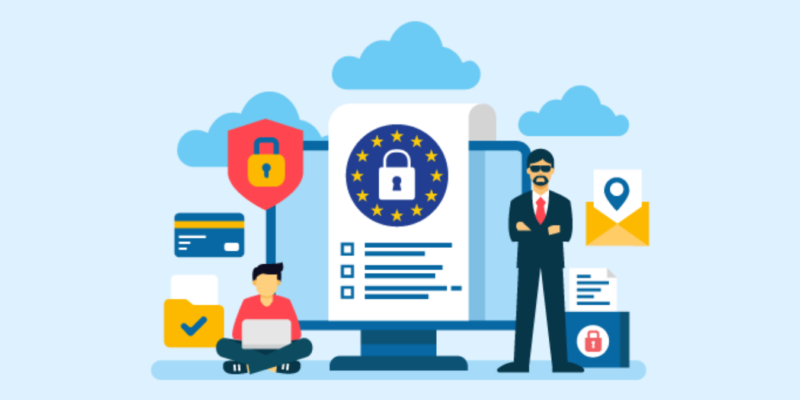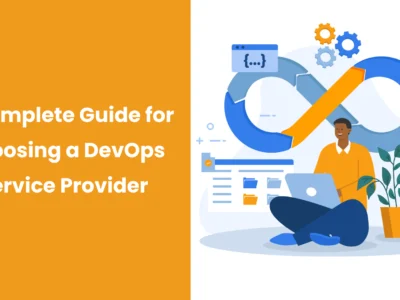What is the Impact of GDPR on Cloud Service Providers
Cloud computing is the future for many global businesses. The advancement of technologies is transforming business processes and flourishing in the industry. Many companies are adopting cloud technology and relishing the benefits of improved optimization of IT resources as they provide scalability and exceptional flexibility.
Thank you for reading this post, don't forget to subscribe!Cloud service providers are the businesses that give infrastructure, network services and business applications on the cloud platform. It allows the companies or individuals to use cloud services for sharing information on the cloud server for business and personal use. The data saved in the cloud platform is available on physical or virtual servers in the data centres of cloud service providers. The maintenance of servers is taken care of by the service providers. The information is accessible to cloud service users via a stable internet connection.
After imposing General Data Protection Regulation (GDPR), remarkable changes get witnessed in many businesses. GDPR impacted the cloud service providers with the application of procedures and security command systems.
Cloud service providers need to comprehend the accountability for data protection and privacy. It allows and enhances the services, agreements and procedures accordingly. Implementation of strict regulations under GDPR, it is explicit that the cloud service providers need to adhere to the capability of controllers and processors, and they can’t bypass the answerability towards data protection.
General Data Protection Regulation
On 25th May 2018, the EU has enforced the General Data Protection Law (GDPR). It is the resilient privacy and security law in the world. It is mainly for European Union (EU), but it restricts global organizations if the collected data is relevant to the citizens of the EU. The regulation consists of extensive 99 articles inclusive of issues regarding data handling with user consent.
The significant changes in GDPR are :
- The latest regulation implies over those companies too, which are based away from EU region but gather the data from EU people.
- The 2-4% annual revenue will get fined over the organization that are violating the law. The fine gets implied according to the gravity of the violation.
- The people whose data comes under the GDPR can demand transparent and data requirements.
- Renewed regulations get included, like the privacy-friendly default setting of electronic devices.
The GDPR framework offers crucial security and more comprehensive corporate accountability related to customer data security. Most organizations believe that it is a remarkable move for the enhancement of data security in the world.
Impact of GDPR on cloud
After the implementation of GDPR, many businesses are struggling to be docile according to the regulatory standards. Also, companies and cloud service providers must alter their business models for the enterprises that are migrating towards cloud services.
They need to modify notable changes in their business operations according to the regulations. Chapter 4 Article, 24-43 of GDPR states rules for Data Controllers and Processors to follow. The law features the accountability, conditions and practices for implementing while handling the personal data.
Role of Cloud Service Provider in GDPR
It is essential to clarify the role of the cloud service providers and the requirements set by GDPR. The cloud service providers can be a data processor or controller, or both. With the appropriate identification of the role, the GDPR implementation is easy to determine. Cloud service providers handling the processing can’t avoid the applicability of security standards because they are also under the GDPR accountability requirement. Hence, the identification of roles and responsibilities is a necessary step while developing the data protection framework.
Challenges for cloud service providers after GDPR
-
Implementation of confinement efficiently in the cloud
According to the GDPR rules, personal data can’t get stored for a long time, then the predefined plans. Hence, implementation of the retention period is essential, and the data needs to get deleted when the confined time gets expired. The challenge is that cloud data gets stored in different locations in multiple jurisdictions, and it is difficult to recognize and manage various jurisdictional confinement needs. The data deletion is also an issue, as the data will get removed and needs backups review. So, it is necessary to have an apparent analysis regarding the backup security and retention management by cloud service providers.
-
Data breach response and coordination
Data breach response accountability and protocols are an essential part of a data processing agreement with the cloud service providers. The covenant should describe the data breaching and mention the procedure by the provider to give notification regarding the breach instantly. If the cloud service provider gets multiple violations that influencing customers, then the controller must own the communication and control the breach management with the service provider support.
-
Handling personal data apart from European Economic Area region
The data gets stored in different locations by the cloud service providers, and there is a possibility of personal data available outside the European Economic Area. In this procedure, proper security measures are essential where no transparent decision is available for the country-specific data. Controllers should describe a multi-country cloud strategy to follow the transparency needs with the data localization regulations.
-
Data flexibility for the controller
The controllers must have authority over the data flexibility. For instance, the cloud data controller must retrieve data in a structured, and give it to another controller in a general machine-readable format. It is crucial to make a contract with the cloud service provider regarding this instance. Cloud service providers must provide the technical capability for satisfying the controllers.
-
Data accountability
A controller must maintain control and responsibility of the data, and it must be predefined. It is requisite to get a confirmation that, as per the hosting countries permissibility, your business can hold the transferred data.
-
Better risk management
Cloud service providers are accountable for better risk management regarding the third party. For clarity about the risk, the cloud service providers can perform Data Protection Impact Assessment and Security Assessment. For performing an appropriate audit, a controlled framework with privacy and design privacy control standards are essential to get defined for a proper audit plan.
[wp_ad_camp_4]
-
Cloud infrastructure and privacy by design
Being a controller, you must understand the elemental technology the cloud service provider utilizes and the effect on the security and protection of the personal data available on the cloud platform.
-
Visibility towards metadata and data optimization
As a controller, if you want to enter a service contract for cloud services, you must attain information related to the types of metadata gathered by cloud service providers. Examine the level of protection provided by the service provider, the authority rights, rights to elect out of collection or distributed metadata, and predetermined utilization of metadata.
-
Privacy security
Being a controller, you can not control the cloud provider’s environment and, you can only rely on the available controls. Hence, it is necessary to understand that at what level the service provider is adhering to your IT security needs. You should also examine the type of IT security and privacy measures the provider has offered.
Conclusion
With GDPR, it is apparent that no business can avert the accountability for secure data processing. Despite outsourcing to third parties or in house, every location which involves direct or indirect processing or can access personal data of EU citizens needs to accept the regulation. An omission of this law can cost the Data Controllers and Data Processors. The cloud service providers need to identify their roles and restrictions in GDPR and realize that compliance and related risks of non-compliance are on a priority level.
[wp_ad_camp_5]












